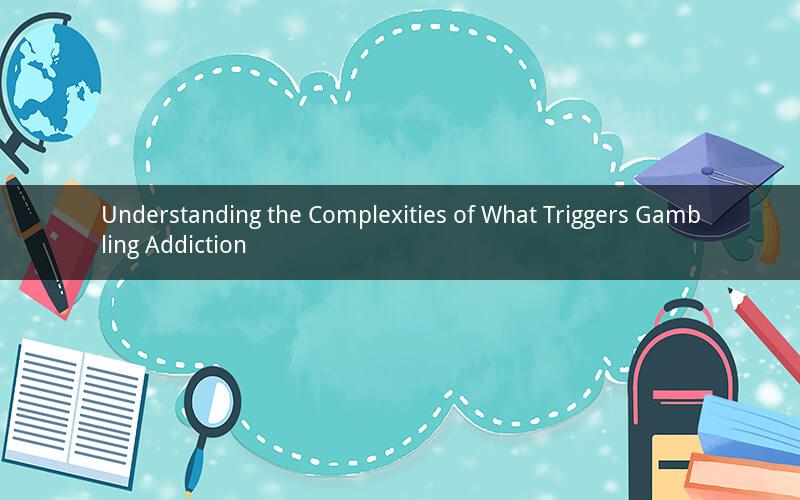
Gambling addiction, also known as problem gambling, is a growing concern among individuals of all ages. It is characterized by an uncontrollable urge to gamble, despite the negative consequences that it may have on one's life. In this article, we will explore the various factors that can trigger gambling addiction, shedding light on the complexities surrounding this issue.
1. Genetic Factors
One of the primary triggers of gambling addiction is genetics. Research indicates that there is a genetic component to problem gambling, making it more likely for some individuals to develop an addiction. Those with a family history of gambling addiction or other addictive behaviors are at a higher risk of developing the same problem.
2. Environmental Factors
The environment plays a significant role in triggering gambling addiction. Individuals who grow up in a family where gambling is seen as a normal pastime or who are exposed to gambling through media and advertisements are more likely to develop an addiction. Additionally, living in a community where gambling is readily accessible can also contribute to the development of gambling addiction.
3. Psychological Factors
Psychological factors, such as low self-esteem, depression, and anxiety, can trigger gambling addiction. Individuals who struggle with these issues may turn to gambling as a way to escape their problems or to experience a sense of excitement and thrill. The euphoria and relaxation that gambling can provide may temporarily alleviate their psychological distress, leading to a cycle of addiction.
4. Social Factors
Social factors, such as peer pressure, can also trigger gambling addiction. Individuals who are influenced by their friends or family members who gamble may be more prone to developing an addiction themselves. Additionally, social events that involve gambling, such as casino nights or poker games, can contribute to the development of an addiction.
5. Cultural Factors
Cultural factors can also play a role in triggering gambling addiction. In some cultures, gambling is seen as a legitimate form of entertainment and is widely accepted. This acceptance can lead to a higher prevalence of gambling addiction within that culture.
Now, let's delve deeper into these triggers and their impact on gambling addiction.
Genetic Factors
Genetic factors play a significant role in gambling addiction. Studies have shown that certain genes may be associated with an increased risk of developing an addiction. These genes can influence an individual's susceptibility to the rewarding effects of gambling, making them more prone to developing an addiction.
Environmental Factors
Environmental factors, such as exposure to gambling through media and advertisements, can trigger gambling addiction. The portrayal of gambling as an exciting and glamorous activity in movies, television shows, and online content can create a desire for individuals to experience the same excitement. Moreover, living in a community where gambling is readily accessible can make it easier for individuals to engage in gambling activities, increasing their risk of developing an addiction.
Psychological Factors
Psychological factors, such as low self-esteem, depression, and anxiety, can trigger gambling addiction. Individuals who struggle with these issues may turn to gambling as a way to cope with their feelings or to escape reality. The thrill and excitement that gambling provides can temporarily alleviate their psychological distress, leading to a cycle of addiction.
Social Factors
Social factors, such as peer pressure, can also trigger gambling addiction. Individuals who are influenced by their friends or family members who gamble may be more prone to developing an addiction themselves. Additionally, social events that involve gambling, such as casino nights or poker games, can contribute to the development of an addiction.
Cultural Factors
Cultural factors can also play a role in triggering gambling addiction. In some cultures, gambling is seen as a legitimate form of entertainment and is widely accepted. This acceptance can lead to a higher prevalence of gambling addiction within that culture.
To better understand the impact of these triggers, let's examine five related questions.
1. How does genetics contribute to gambling addiction?
Genetic factors can influence an individual's susceptibility to the rewarding effects of gambling. Those with a family history of gambling addiction or other addictive behaviors may have a genetic predisposition that makes them more prone to developing an addiction.
2. What role does the environment play in triggering gambling addiction?
The environment plays a significant role in triggering gambling addiction. Excessive exposure to gambling through media, advertisements, and living in a community where gambling is readily accessible can increase an individual's risk of developing an addiction.
3. How can psychological factors contribute to gambling addiction?
Psychological factors, such as low self-esteem, depression, and anxiety, can contribute to gambling addiction. Individuals who struggle with these issues may turn to gambling as a way to cope with their feelings or to experience a sense of excitement and thrill.
4. How can social factors influence the development of gambling addiction?
Social factors, such as peer pressure and social events involving gambling, can influence the development of gambling addiction. Individuals who are influenced by their friends or family members who gamble may be more prone to developing an addiction themselves.
5. How can cultural factors contribute to the prevalence of gambling addiction?
Cultural factors, such as the acceptance of gambling as a form of entertainment, can contribute to the prevalence of gambling addiction. In cultures where gambling is widely accepted, the risk of developing an addiction may be higher.
In conclusion, gambling addiction is a complex issue influenced by a combination of genetic, environmental, psychological, social, and cultural factors. Understanding these triggers can help individuals recognize the signs of addiction and seek appropriate treatment. It is crucial to address these factors to break the cycle of gambling addiction and promote a healthier lifestyle.